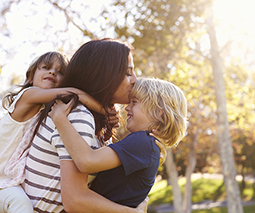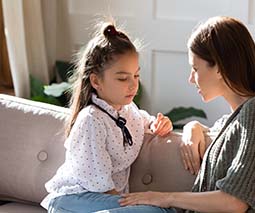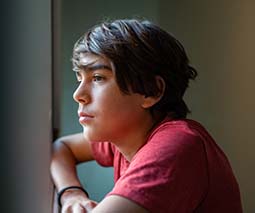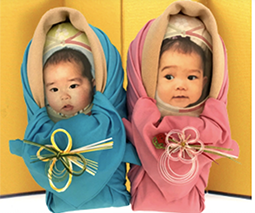The message behind the 7-year-old’s TED Talk that went viral
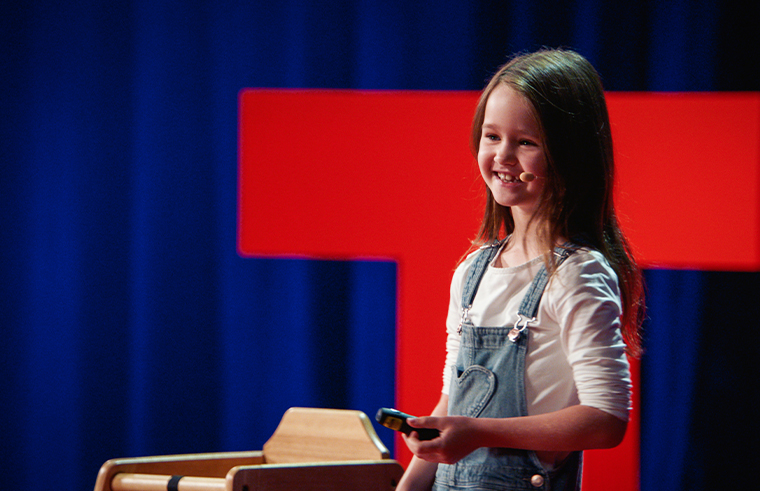
When seven-year-old Molly Wright gave her TED talk at the Opera House in April, the idea was to make new parents aware of the importance of connection, interaction and healthy brain development during the first five years of a child’s life.
But it wasn’t only new parents who watched the now viral video that has, since its launch on the TED Talk website on Thursday, been viewed almost one million times. People of all ages have gravitated toward the message delivered by the Queensland second grader.
The importance of Peek-a-Boo
Developed through an early childhood learning program, Thrive By Five which is supported by Mindaroo Foundation, a philanthropic organisation in Perth, the video begins with Molly asking a simple but profound question:
“What if I was to tell you that a game of peek-a-boo could change the world?”
Professor Desiree Silva, Head of Paediatrics at Joondalup Health Campus in Perth, believes it can.
“There’s an absolutely amazing foundation that’s been developed in a child’s brain – even before birth – that is critically important in terms of connections,” Professor Silva told Shevonne Hunt on Babyology’s Feed Play Love podcast. ”
As Molly says, the brain can make up to one million neural connections every second, and without those basic interactions like talking, playing and connecting with caregivers – there can be other types of issues, like anxiety, that surface later on.”
Peek-a-boo, says Silva, is not only is building imagination and empathy in your baby, it’s also building trust. “It’s a game, so it’s essentially playing with your child, but it’s also providing those life skills that go toward regulating anxiety and lengthening memory.”
Silva says the aim of the TED Talk was to make the message – that connection with your baby can develop her brain to its full potential – as easy and straightforward as possible.
“We have been showing it in our maternity wards over the last three weeks to new parents, and we’ve had a great response.”
Listen to Professor Desiree Silva on Feed Play Love:
Your baby’s brain in the first five years
“By the time a child reaches seven years old, like Molly, her brain has already grown to 90 percent of its size of volume” says Silva. “That’s why those first five years are absolutely critical in terms of parent-baby engagement.”
Anxiety is a bear in the room
“As paediatricians, we’ve seen a real increase in toddler meltdowns over the last few years, and nurses have also mentioned that these beautiful babies being born aren’t connecting like they used to. So that the fight or flight response in a child’s brain is not balanced” says Silva, who compares anxiety in a little one to a bear.
“You know what you’d be like if suddenly I said, ‘There’s a bear behind you!’ It would ignite your fight or flight response – that is what kids are experiencing several times during the day. You don’t have to be talking to your child all the time, but just stopping and listening, or engaging can lessen it.
“There’s a tiny part of the brain responsible for the fear response – it’s called the amygdala. And if you can stabilise the amygdala, then you don’t get that constant flight or fight response, and they’re much calmer kids – and adults.”

Connection can stabilise the brain
“We’ve been doing a lot of work trying to understand what things can stabilise that part of the brain and it starts right back in pregnancy. It’s a case of eating healthy foods, because your microbiome is really important. It’s being outside, sleeping well, reducing our stress – these are all the things that actually help the baby develop inside the womb.
“And then once your baby’s born, these things are still really important in terms of brain development and it’s not rocket science. It’s the baby being given the right foods, being outside, being connected to nature, that actually does help brain development more than we realise.”
Silva continues, “But one of the most important ways we can support brain development is by connecting with our babies – talking to and playing with them” she says.
“Molly is an exceptional little girl, and a great way to get that message across.”
 Need some support to be the best parent you can be? Our Parent School parent coaching experts can help. Click to find out more or book a one-on-one session.
Need some support to be the best parent you can be? Our Parent School parent coaching experts can help. Click to find out more or book a one-on-one session.


